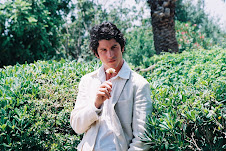 Director Joseph Cedar (left) and Aviva Weintraub, Director of the NYJFF and Associate Curator of the The Jewish Museum.
Director Joseph Cedar (left) and Aviva Weintraub, Director of the NYJFF and Associate Curator of the The Jewish Museum.
After the festival’s screening of the film, director Joseph Cedar (Time of Favor, Campfire) answered questions from the audience.
How did you get involved with the project? It started out as a newspaper article by Ron Leshem, which consisted of a monologue from an officer who was on the outpost a year before Israel pulled out. It was a phenomenal article—very dry, very detailed, very unaware of how tragic the story that he was telling actually was. I met with Ron, who was then military correspondent for Yedioth, and we decided to turn the article into a film. As I was working on another film, his research turned into a novel (which is now published in America). So these two separate works are based on the same historical events: The novel is much wider in scope with a slightly different emphasis, while the film is narrower in scope and makes different artistic choices.
Did you film any part of this in Lebanon? We shot the film on a mountain called Kalat Namrud in Northern Israel, right at the triangle of borders between Syria, Lebanon and Israel. I have some nostalgia for Lebanon and—especially after so intensively working on this story—would have wanted to be back on the original mountain, but not enough to take any risks. It’s a film: Everything is artificial, everything was made for the camera. There were certain things that needed to be authentic, but I also like the idea that it’s all bluff in that everything was made for the camera.
Did you serve in Lebanon as you mentioned your nostalgia for there? I think anyone who spent time on this mountain (this is actually a sentence from the book) “has sad memories of fantastic times”. There’s a line in the film where the soldiers are standing on a cliff, looking at the view and feeling like something has changed. I’m intimately familiar with that sense of being in a place that somehow has become part of you, but then starting to see that place differently. There’s a relationship between the soldiers and the mountain that they’re asked to give their lives for—I think that’s actually the main relationship in the film.
 A scene from Beaufort.
A scene from Beaufort.What was the budget for the film and how did you raise the funds? The answer to that depends on who you ask. The budget was around two and a half million dollars, which is very low for a war film anywhere outside of Israel, but relatively high for an Israeli film. We received about 30% of that from government funds, another 30% from TV stations and the rest through private film investors.
What was the reaction to the film when it opened in Israel? A lot of people went to see it and I think that some of them liked it. It was very high profile in Israel when it was released last March. It came after the previous summer’s war in Lebanon, which, to my mind, interfered with our publicity plans but turned it into something that felt relevant. I always thought that I was telling a story which wasn’t specific in terms of time or even location: I thought it was a story that could take place anywhere, anytime. But the context of the previous summer’s war turned it into something that was grounded in a more particular historical event.
Could you discuss this film in the context of your other films to date? From film to film, I try to correct my mistakes. There are regrets concerning one film that I try to fix in the next film, which takes me through a whole new series of regrets. This film contained a lot of lessons that I wanted to correct from my previous film. Shooting in one location gave us flexibility that turned out to be very creative: For the first time in my short career, I felt creative on set. We were still investigating the story while we were shooting. It wasn’t all there at the screenplay level. That felt very good to me. Beaufort is not as tightly structured as my previous films. I don’t know if that’s the direction in which I’m going to continue but I like that aspect of this one.
What happened to Beaufort? The military part was blown up on May 24, 2000. Since then, although there’s a Hezbollah flag on the ruins of the Crusader fortress, it has turned into a tourist site. If you go online and look for Beaufort, you can see photographs or videos of tourists who have gone up there. Although I’m not sure I can support this with facts, I heard that in the last war, Beaufort was purposely avoided. There was an order from very high up to not go near that mountain again which I think is really amazing: It was the first target, the most important strategic spot, when Israel first went into Lebanon in ‘82 and it really evolved from a being symbol of victory or power into being a symbol of stupidity. And the last thing anyone wanted was an Israeli flag on that mountain again.

.jpg)

No comments:
Post a Comment